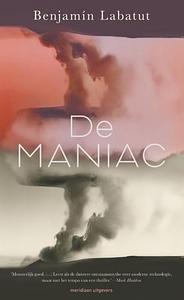Take a photo of a barcode or cover
Labatutov 'roman' je samo još jedan dokaz da malo koji autor napiše više od jedne knjige - komotno može da se tretira kao adendum na prethodni, za Bukera nominovan, When we cease to understand the world. Ista kombinacija naučne istoriografije, fiktivne biografije, i lavkraftovskog užasa. Možda malo fokusiranje, ali teško da može da se ova sinteza tri celine nazove romanom u klasičnom smislu. Najveći deo romana je o Von Neumann-u, i ubedljivo ostavlja najjači utisak. Uvertira i koda - ako ćemo tako da posmatramo prvi i treći deo - samo pojačavaju taj utisak. Čekam i treću prvu knjigu od Labatuta i pomalo se nadam da će snažnije da zaokruži priču sledeći put.
4+
4+
Enjoyed a lot. Probably need to reread. Mix between wanting to learn about the topic and wanting to know how the story progresses.
reflective
medium-paced
Plot or Character Driven:
Character
Strong character development:
Yes
Loveable characters:
Complicated
Flaws of characters a main focus:
Yes
Benjamín Labatut leaves me speechless and conemplative every time. Great book. I am terrified.
Fascinating history of how computers, nuclear warfare and AI developed out of brilliant mind of mathematicians. The math language took me a bit to follow.
challenging
dark
informative
medium-paced
Plot or Character Driven:
A mix
Strong character development:
Complicated
Loveable characters:
No
Diverse cast of characters:
No
Flaws of characters a main focus:
Complicated
Labatut I think is a remarkable modern writer. For what could be such a tedious topic, he excels in creating an enjoyable, thought-provoking read on the advancement of mathematics in the 20th century by ‘genius’ figures, and the subsequent inventions of nuclear weapons, and AI. The fact-fiction style works wonders as he unpicks John von Neumann and some of his contemporaries documented lives, while taking certain liberty in examining the workings of their inner minds, exploring how they confronted the challenges and darkness of the age as well as the opportunities, and bending the understanding of what is meant by ‘intelligence’.
The book brings you to ruminate ideas on perhaps the biggest questions of our age, where will AI lead us and what will be the result of it?
The book brings you to ruminate ideas on perhaps the biggest questions of our age, where will AI lead us and what will be the result of it?
informative
reflective
slow-paced
Plot or Character Driven:
Character
Strong character development:
Yes
Loveable characters:
No
Diverse cast of characters:
No
Flaws of characters a main focus:
Yes
incredible but could’ve been a little more to the point
Exquisite. Gripping. Foreboding.
Reader beware: If you are not measured and careful not to let your eyes get ahead of themselves, Labatut’s words will take hold of your system like the meanest popsicle you’ve ever had. One second you are savoring every lick completely unaware, then BAM! Blinding brain-freeze and back-of-the-neck chills.
If you are like me, you’ll keep going back for seconds.
Ok, so what is it? It’s fiction. It’s based on fact. It’s poetic. It’s philosophical. It’s instructive. It’s destructive. It’s “stream of consciousness”. It’s second-hand accounts. It’s very real.
It’s engrossing, too. So by the time you reach the final pages you could look back and see how it was all inevitable, really. All the lives, and one life’s work. We can see it now, looking back. But only the MANIAC could see it back then.
That’s what it is. What’s it about?
It’s about the life and work of John Von Neumann, self-replicating machines, Gödel, incompleteness, virtual universes, AlphaGo. It’s also about unfathomable monstrosities and mutually assured destruction (MAD):
They say that great technology is “frozen experience” - all the knowledge captured and embodied during its creation. So that is, in essence, Von Neumann’s legacy: a force of intellect so powerful that it birthed ideas as brilliant and destructive as they are enduring. Bombs. Computers. AI. A mind frozen for future generations.
Highest possible recommendation!
Reader beware: If you are not measured and careful not to let your eyes get ahead of themselves, Labatut’s words will take hold of your system like the meanest popsicle you’ve ever had. One second you are savoring every lick completely unaware, then BAM! Blinding brain-freeze and back-of-the-neck chills.
If you are like me, you’ll keep going back for seconds.
Ok, so what is it? It’s fiction. It’s based on fact. It’s poetic. It’s philosophical. It’s instructive. It’s destructive. It’s “stream of consciousness”. It’s second-hand accounts. It’s very real.
It’s engrossing, too. So by the time you reach the final pages you could look back and see how it was all inevitable, really. All the lives, and one life’s work. We can see it now, looking back. But only the MANIAC could see it back then.
That’s what it is. What’s it about?
It’s about the life and work of John Von Neumann, self-replicating machines, Gödel, incompleteness, virtual universes, AlphaGo. It’s also about unfathomable monstrosities and mutually assured destruction (MAD):
“So those cursed things came alive within the digital circuits of a computer before exploding into our world.”
They say that great technology is “frozen experience” - all the knowledge captured and embodied during its creation. So that is, in essence, Von Neumann’s legacy: a force of intellect so powerful that it birthed ideas as brilliant and destructive as they are enduring. Bombs. Computers. AI. A mind frozen for future generations.
It's scary how science works. Just think about this for a second: the most creative and the most destructive of human inventions arose at exactly the same time. So much of the high-tech world we live in today, with its conquest of space and extraordinary advances in biology and medicine, were spurred on by one man's monomania and the need to develop electronic computers to calculate whether an H-bomb could be built or not.
Or think about Ulam. This Polish mathematician who almost died, who had one foot/both feet in the grave, but then from his deranged imagination we get this unbelievable technique that opens up a new domain in mathematical physics just at the right moment, with just the right technology waiting for it.
And then the world catches fire.
Highest possible recommendation!
Rather fittingly, the fictional details read like the human equivalent of a generative AI “hallucinating” details. Approximations and extrapolations derived from historic data. And the 3rd party perspectives are fictionalised with intent to provide context and fidelity to the events that feed the narrative.
challenging
inspiring
mysterious
reflective
slow-paced
Plot or Character Driven:
Character
Strong character development:
No
Loveable characters:
Complicated
Diverse cast of characters:
Yes
Flaws of characters a main focus:
Yes





